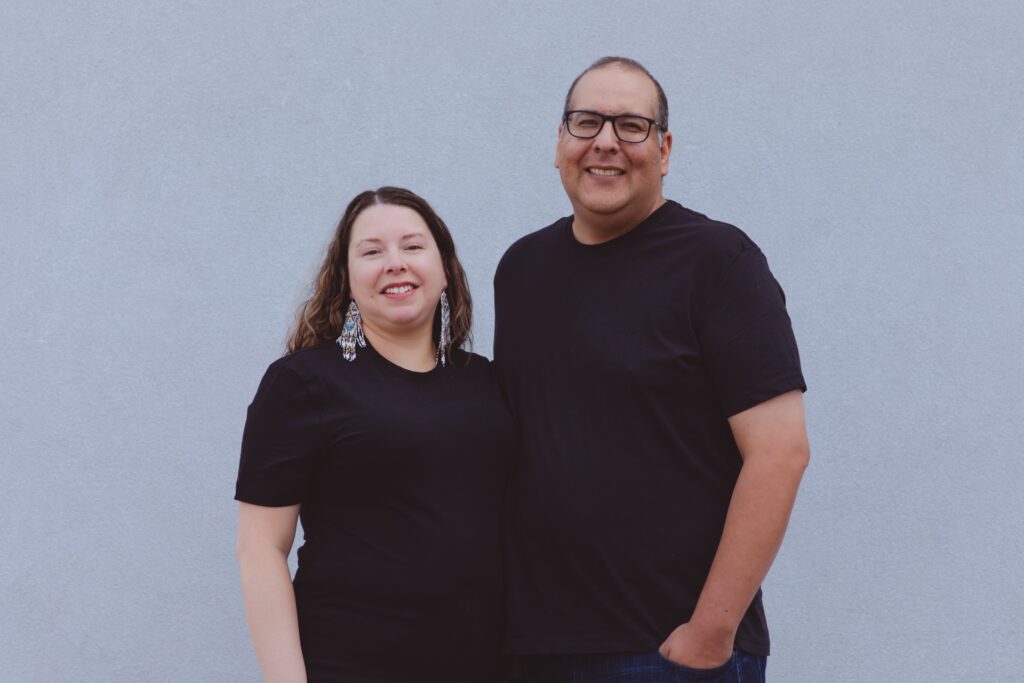
How do you take your coffee?
Dr. Shyra Barberstock (Co-Founder and CEO) – Black, or with a spoonful of honey.
Dr. Ryan “Rye” Barberstock (Co-Founder and COO) – Coffee with cream and sugar.
Tell us about some of the challenges (and joys!) of being a member of the coffee community
Breaking into the coffee industry as an Indigenous-led company means stepping into a space dominated by long-standing, national and global brands. The challenge of carving out our place in this competitive market drives us to think differently, crafting coffee that not only tastes distinct but carries meaning. What sets us apart isn’t just flavour; it’s our story.
At Kebaonish, our products are grounded in Anishinaabe and Haudenosaunee worldviews, bringing a perspective to coffee that the industry has yet to see. Each cup embodies innovation rooted in culture, carrying with it a narrative of connection: to the land where the beans are grown, to the communities that nurture them, and to the traditions that remind us that food and drink are inseparable from our health and well-being.
In this way, we aren’t just entering the market; we are redefining it. By offering more than a product, we’re building a brand that honours Indigenous knowledge systems while giving consumers a new, authentic story to experience and share.
How has being part of the BIPOC community strengthened or challenged your experience in Canadian coffee?
Being part of the BIPOC community has given us both strength and perspective as we enter the Canadian coffee industry. On one hand, it allows us to bring forward stories, values, and traditions that have often been overlooked in mainstream food and beverage spaces. Our identity as an Indigenous-led company shapes everything from how we source and blend our coffee to the way we build relationships with customers, suppliers, and communities.
It strengthens us by grounding our business in Anishinaabe and Haudenosaunee cultures, responsibility, and holistic thinking. At the same time, being part of the BIPOC community means navigating an industry where representation is still limited. The Canadian coffee sector remains heavily dominated by large, established companies that don’t always reflect the cultural diversity of the people drinking their products.
This creates challenges in gaining access to markets, building visibility, or breaking through existing networks that have long histories and strong roots. But rather than seeing this as a barrier, we view it as motivation. We recognize that our presence in this space helps create pathways for other Indigenous and BIPOC entrepreneurs who wish to enter and thrive in the industry.
Has the Canadian coffee landscape changed in terms of diversity & inclusion since you've started working 3 years ago?
What we are quickly learning as that the Canadian landscape is very much an interconnected community with deep roots in the industry. It is hard to say how the industry has changed, as we are a newer company, but what we can say is that we are seeing more Indigenous-led coffee companies entering the market, and we couldn’t be more proud of this, as we believe in the abundance mindset—that there is plenty of opportunity and business for any entrepreneur in the industry.
If you could work towards ONE thing to increase diversity & inclusion in Canadian coffee, what would this be?
The Canadian coffee landscape is still evolving in terms of diversity and inclusion. As a newer company, we recognize that we don’t have decades of history in the industry to compare against, but what we do see today is encouraging. More Indigenous-led coffee companies are emerging across the country, each bringing its own story, community connections, and approach to sustainability.
We couldn’t be prouder of this shift because it reflects the abundance mindset we believe in—that there is room for many voices, many stories, and many entrepreneurs to succeed in this industry. Diversity in coffee isn’t just about representation; it’s about enriching the entire ecosystem. When different cultural perspectives come into the market, it creates space for innovation, deeper connections with consumers, and business models that value relationships as much as profit.
For us, inclusion means ensuring that Indigenous Peoples and other underrepresented groups are not only visible but are shaping the future of Canadian coffee. We believe that by lifting each other up and sharing space in the industry, we can move toward a marketplace that is not only more diverse but also more reflective of the values of equity, respect, and reciprocity.